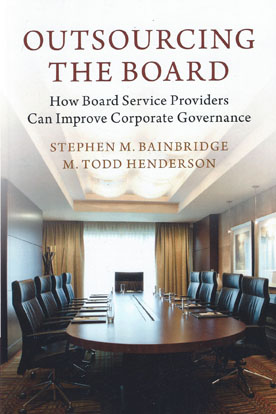
In this groundbreaking work, Stephen M. Bainbridge and M. Todd Henderson change the conversation about corporate governance by examining the origins, roles, and performance of boards with a simple question in mind: why does the law require governance to be delivered through individual board members?
While tracing the development of boards from quasi-political bodies through the current 'monitoring' role, the authors find the reasons for this requirement to be wanting. Instead, they propose that corporations be permitted to hire other business associations - known as 'Board Service Providers' or BSPs - to provide governance services.
Just as corporations hire law firms, accounting firms, and consulting firms, so too should they be permitted to hire governance firms, a small change that will dramatically increase board accountability and enable governance to be delivered more efficiently.
Outsourcing the Board should be read by academics, policymakers, and those within the corporations that will benefit from this change.